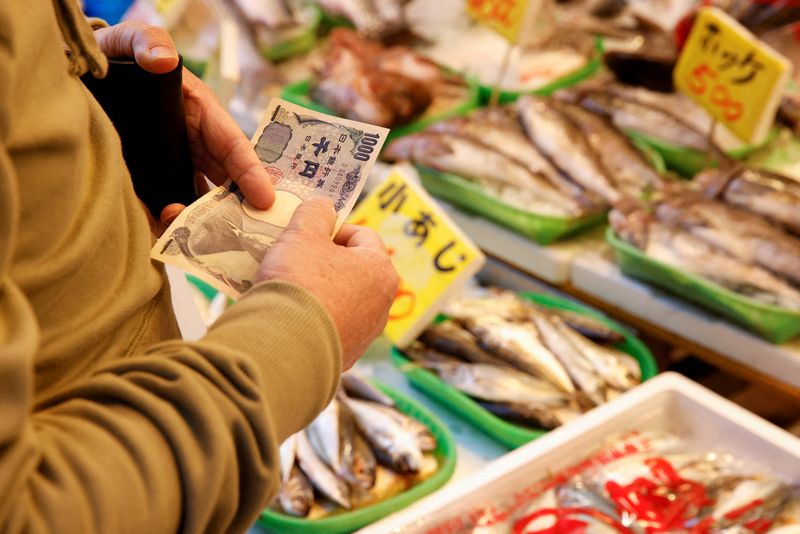By Leika Kihara and Tetsushi Kajimoto
TOKYO (Reuters) -Japan's inflation will likely slow to around 1.5% next year when stripping away the effect of one-off factors, a government spokesperson said on Monday, calling on the central bank to work towards achieving its 2% inflation target.
The remarks came amid simmering market speculation that creeping inflation and robust wage growth will prod the Bank of Japan (BOJ) to tweak its yield control policy at a two-day rate review ending on Friday.
"Specific monetary policy means fall on the jurisdiction of the BOJ. But we hope it takes appropriate, necessary steps in close coordination with the government based on an understanding agreed upon in our joint statement," government spokesperson Yoshihiko Isozaki told a news conference.
Under the joint agreement with the government signed in 2013 and re-confirmed by the current administration, the BOJ pledges to achieve 2% inflation at the earliest date possible.
In a mid-year review of its forecasts, the government said last week it expects overall consumer inflation to hit 2.6% for the fiscal year that began in April and 1.9% in 2024.
"The forecasts take into account the base-effect of the government's utility subsidies. Excluding the effect, we expect inflation to move around 1.5% in fiscal 2024," Isozaki said, suggesting that trend inflation will fall short of the BOJ's target next year.
"We'd like to continue doing our utmost to achieve a positive cycle of wages and inflation, as well as growth and distribution, with an eye on ending deflation," he said.
Isozaki's comments came in response to a question on whether the government saw conditions falling into place for the BOJ to phase out its massive stimulus.
The remarks differ in tone from those made earlier on Monday by top currency diplomat Masato Kanda, who said recent inflation and wage rises were overshooting expectations.
"It's become a shared view at home and abroad that changes are seen in Japan's corporate price- and wage-setting behaviour," Kanda told reporters, adding that he expects the BOJ to revise up its inflation forecasts this week.
On Friday, Kanda told Reuters that "various expectations and speculations are spreading about the possibility of some kind of tweak to monetary policy."
Sources have told Reuters the BOJ is leaning toward keeping its yield control policy steady this week, though there is no consensus within the bank.

While the board is likely to revise up its core consumer inflation forecast for the year that began in April, those for fiscal 2024 and 2025 will likely remain largely unchanged from current projections, they said.
BOJ Governor Kazuo Ueda has said the central bank is focusing on whether recent inflation and wage growth will be sustained next year, and backed more by domestic demand, in deciding whether to tweak yield curve control.